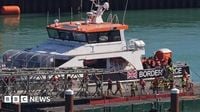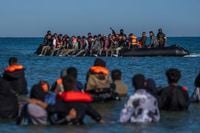On Tuesday, September 9, 2025, tragedy struck in the waters of the English Channel as a woman lost her life while attempting to cross from France to the United Kingdom in an overloaded migrant boat. The incident, which unfolded around midday roughly 10 miles off the coast of Dover, has reignited urgent conversations about the perils of small boat crossings and the policies shaping migration between the UK and mainland Europe.
According to multiple reports, including those from BBC, Sky News, and The Independent, the vessel, described as a dinghy packed with migrants, suffered what authorities have called a "catastrophic deflation" at around 12:30 pm. The sudden collapse of the boat precipitated a frantic rescue operation. The UK Coastguard responded swiftly, deploying a Border Force vessel, two lifeboats from the Royal National Lifeboat Institution (RNLI), and a helicopter. As the rescue unfolded, a mayday alert was broadcast to nearby ships, appealing for immediate assistance.
Kent Police, notified by the Coastguard just after 1 pm, confirmed that the woman was rescued from the water and airlifted back to shore. Despite the best efforts of emergency responders—including CPR administered by the Walmer RNLI crew—she was pronounced dead upon arrival in Dover. "Kent Police was made aware by the coastguard of an incident in the Channel involving a small boat just after 1pm on Tuesday 9 September 2025," a police spokesperson stated. "One woman was airlifted back to shore, where she was pronounced deceased. Officers are conducting enquiries to establish the circumstances surrounding the incident."
The rescue operation was extensive. The Maritime and Coastguard Agency detailed the deployment of Border Force vessels, RNLI lifeboats, and HM Coastguard aircraft in response to what was officially described as "small boat activity." A coastguard emergency helicopter was seen circling above the Port of Dover, and two coastguard vans and ambulances waited onshore to receive survivors. Several other individuals were pulled from the water by HM Coastguard, and a group believed to be migrants was later brought into the Border Force compound in Dover, as documented by BBC and Sky News.
Authorities have yet to release the identity of the deceased woman or details about her journey, but the government’s response was swift and somber. A spokesperson expressed the administration’s deep sorrow, saying, "We are shocked and saddened by this tragic incident. Our immediate thoughts are with all of those who have been affected." The statement continued, "This latest tragedy underlines the terrible dangers of small boat crossings, and we continue to do everything we can to prevent callous criminals exploiting vulnerable people."
The scale of Channel crossings remains staggering. On the same day as the fatal incident, about 500 people are believed to have made the journey across the narrow but treacherous stretch of water, according to Home Office figures cited by BBC. In total, more than 30,000 people have reached the UK in small boats so far in 2025, and over 50,000 have crossed since Labour assumed power in July 2024. The numbers, while daunting, tell only part of the story. Behind each crossing are individual stories of hardship, hope, and, all too often, loss.
The dangers of the journey are well documented. Last year alone, 77 people died attempting the crossing, according to French authorities, while UK government sources reported 50 lives lost. Each incident renews calls for a comprehensive and humanitarian approach to migration. Enver Solomon, CEO of the Refugee Council, voiced the anguish felt by many advocates: "This is another heartbreaking and needless loss of life. These deaths are happening far too often, and to prevent more the government must work with our French and European neighbours to share responsibility and create safe and legal pathways for people to come to the UK."
The government has introduced new policies in an effort to manage the crisis. Since August, a "one in, one out" agreement with France has been in effect. Under this arrangement, for every migrant the UK returns to France, another with a strong case for asylum in Britain is allowed to stay. While intended to balance humanitarian obligations with border control, the policy’s effectiveness remains a subject of debate.
The incident has also prompted scrutiny of border enforcement. On the same weekend as the fatal crossing, reports emerged that a migrant boat may have reached the Kent coast without interception by Border Force—the first such occurrence since December 2022. Kent Police confirmed that five people were detained near Kingsdown and passed to immigration authorities, coinciding with a day when more than 1,000 people were recorded arriving in the UK by small boat. The Prime Minister’s spokesperson addressed the incident, stating, "My understanding is the circumstances of their arrival are being investigated, that all five people were placed under immigration control. We obviously have significant arrangements and technology in place to prevent uncontrolled landings."
Public reaction to these events has been charged and multifaceted. While government officials emphasize the need to disrupt criminal smuggling networks and deter dangerous crossings, humanitarian organizations stress the importance of safe and legal routes for asylum seekers. The government’s stance, as articulated by its spokesperson, is clear: "We continue to do everything we can to prevent callous criminals exploiting vulnerable people." Yet, critics argue that without addressing the root causes of migration and expanding legal pathways, tragedies like Tuesday’s will persist.
For local communities in Kent and along the Channel coast, the ongoing arrivals and frequent emergencies are a daily reality. Images of Border Force vessels disembarking groups of migrants—many wearing life jackets, some visibly shaken—have become commonplace. Emergency services, including the RNLI and Coastguard, are regularly called upon to respond to life-and-death situations, often at great personal risk.
As investigations into the precise circumstances of Tuesday’s tragedy continue, the broader questions remain unresolved. How can the UK and its European neighbors better share responsibility for those seeking refuge? What measures will truly deter dangerous crossings without endangering lives or violating international obligations? And, perhaps most urgently, how many more lives will be lost before a lasting solution is found?
For now, the Channel claims another victim, and the debate over migration, safety, and compassion is once again at the forefront of British and European consciousness. As one government spokesperson put it, "Our immediate thoughts are with all of those who have been affected." But for those who risk everything for a chance at safety, thoughts and condolences may not be enough.






